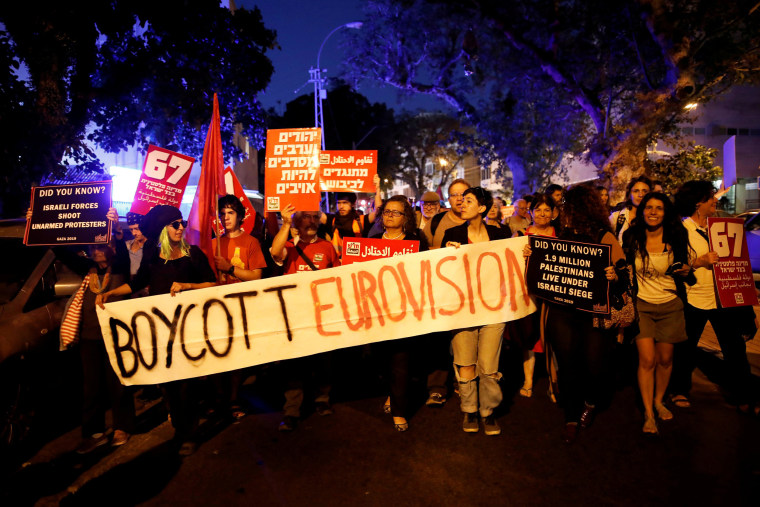If it’s mid-May, then it’s time once again for the Eurovision Song Contest, the massive international singing competition that has been airing across the pond since 1956. This year marks the 64th edition of Eurovision, with 41 countries participating (down from last year’s high of 43). While contestants mainly hail from Europe, any country that carries a member of the public service media channels of the European Broadcasting Union (the EBU, which produces Eurovision) is technically eligible to compete. This is why Australia is included among the competitors this year, as is Israel, which won the 2018 Grand Final, and with it, the honor of hosting this year’s competition. However, the road to this year’s show has not been easy, as the political realities of broadcasting from Tel Aviv have threatened to overtake the producers’ “One World, Joined In Song” ideals.
The road to this year’s show has not been easy, as the political realities of broadcasting from Tel Aviv have threatened to overtake the producers’ “One World, Joined In Song” ideals.
Eurovision likes to insist the contest is non-political, but that has never been true. When the show was first created back in the 1950s, the idea was to create a good-natured contest in which the many countries of Europe could join hands and use the newfangled technology of television to share the best of their homegrown musical talents. But from the beginning, politics was always a factor, whether it was the ability of smaller countries to afford to participate or the exclusion of European countries on the communist side of the east-west divide. Since the fall of the Iron Curtain, most countries are now welcome, but the sphere of influence remains. One has only to look at the absurdly high scores given to Russia by the juries in Russia’s closest satellite states, or the extraordinarily low score in the popular vote given to the U.K. in this post-Brexit landscape, to see how global tensions and alliances impact the contest.
Want more articles like this? Sign up for the THINK newsletter to get weekly pop culture analysis
Israel, for obvious reasons, was always going to be a lightning rod. From the moment Israeli singer Netta won the 2018 contest, a boycott was brewing from the Boycott, Divestment and Sanctions movement (BDS), a pro-Palestinian organization. But the optics of holding the show in Israel during a time of rising anti-Semitic feeling in Europe is actually in line with Eurovision’s ideals. The boycott failed — although controversy lingered. As it is, the show’s willingness to use the “Greater Israel” logo, which insists on treating both the occupied Gaza Strip and West Bank as part of Israel’s borders, has raised more than a few eyebrows.
Perhaps as a result of the fallout, organizers of this year’s contest overcompensated with guest stars. Both the semi-finals and the Grand Final contest follow the same format of performances followed by a period of jury and public voting. To fill airtime while the votes are tabulated, Eurovision brings in guest stars to perform. Most of these so-called interval acts have usually been associated with the host country, but this year Israel went all out and picked a global superstar: Madonna. After lengthy negotiations that did not come together until very recently, the Israeli Canadian businessman Sylvan Adams (who calls himself an “ambassador at large for Israel”) finally paid her $1 million fee to appear. Madonna is the third American-born star to perform in the Interval slot in the show’s history, and the second American megastar to perform on the show in less than five years. (Justin Timberlake performed in 2016.) There’s just one small problem: Americans won’t be able to see her.
Timberlake’s performance in 2016 coincided with the show’s debut on American television, airing on the LBGTQ-friendly channel Logo TV. Madonna will coincide with the end of the show’s run on the channel, as Logo will not been airing this year’s contest. With YouTube geoblocking both the livestream and the videos of this year’s semi-final performances so far, Madonna’s home market will wind up unable to (legally) watch what is sure to be a crucial part of the promotion for her new album “Madame X.” There was some hope Netflix might get involved, as they have a Eurovision-themed comedy from Will Ferrell lined up, but the answer is no for this year.
On the other hand, Logo’s decision to walk away from showing the contest may yet pay dividends as it seems to have spurred the European Broadcasting Union to finally begin development on the long-rumored North American version of the show. According to The Hollywood Reporter, the EBU has licensed the format to the Swedish production company Brain Academy, which is reportedly looking to bring the contest, with competitors drawn from the 23 countries of North America, to the airwaves in 2021.
The “American Song Contest” (Amerivision?) might have a decent shot in the ratings game. The Eurovision final only brought Logo around 74,000 viewers last year, but “American Idol” is still faring well, with an average of 7.4 million this season. Perhaps resetting the contest so that viewers have stakes in the outcome will make the difference. Eurovision has survived despite all the political drama, and the U.S. largely ignoring it for decades. But the politics of our nation, not to mention our treatment of our neighbors, will almost certainly be a factor in whatever comes next.


